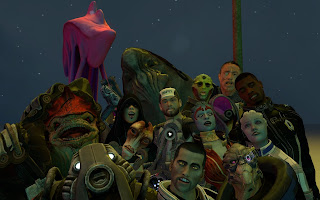Video Games and Art: An Unfortunate Truth

I love video games. For as long as I can remember, I have been an avid gamer. From Nintendo all the way up to Xbox 360. For the longest time, I thought games were nothing more than a fun and challenging way to spend your spare time. My opinions of games changed around the time a purchased a PlayStation console some time in 1998. I had bought Metal Gear Solid as my first game for the system. I was amazed by the story, the conflict, the dark hero, the themes, the music, everything was pitch perfect. I am not ashamed to admit that Metal Gear Solid made me cry a little. I have never before felt such emotion in a video game before. Later that year, Legend of Zelda: Ocarina of Time was released for the Nintendo 64. Once again, I was taken on yet another emotional journey filled action and adventure. The depth and complexity of both games stories made me realize something I had never considered before: video games are in fact art. Little did I know that more than 10 years later, I would realize that I could not have been further from the truth.
To clarify, I do not subscribe to Ebert opinions on why video games can’t be art. It seems like every time he attempts to justify his position, he merely proves that games should be considered art. Ebert believes that in order for something to be considered art, it needs to make a statement, and needs to bring about a subconscious emotional reaction to what is being seen. For someone who considers movies to be art, he has no legitimate right to say that games are not art. My reasons for accusing games of not being art are very different.
I believe that in order for something to be art, it needs to meet certain criteria first. The first is it needs to be generally artistic in nature. It needs to be something created form nothing, or from very little. Video games have this one in the bag. Art also, as Ebert believes, needs to make some kind of statement. It also needs to be able to bring about an emotional response of some kind. Again video games have performed the necessary criteria here. Finally, if something is art, it can be analyzed, discussed, and interpreted by those who are fans of the art form. This is where video games lose its merit.
Gamers like to believe they think games are art. Studios and critics like to believe that games are art as well. They are lying to themselves. They want to believe, and yet they refuse to treat games like art. When I think of some of the most recent culturally significant works of art in video games I think of four games: Fallout 3 by Bethesda, the Mass Effect and Dragon Age series by Bioware, and Red Dead Redemption by Rockstar Games. Each game should be art. The designers clearly made them to be art, but unfortunately, the industry is so mired by immaturity that it is hard to take even the most brilliant works in gaming seriously.
Fallout 3 told a story of a young man (or woman) growing up in a post-apocalyptic world. Raised inside a subterranean Vault to avoid the disaster of nuclear holocaust that was present on the surface of what was considered Earth, this young hero left the confines of the Vault and ventured out into the unknown searching for his (or her) father. The story featured parallels to the bible and featured a Messiah-like protagonist. At the end of the story, the hero either lived as a wretched and selfish individual, no better than anyone else out in the wastes, or had sacrificed his life for a better tomorrow. Gamers despised the ending, likely due to the fact that the hero died in the end, or was a selfish jerk. I had the pleasure of discussing the story of Fallout 3 with Gears of War 2 writer, Joshua Ortega. He and I shared the same opinion that Fallout 3’s story was brilliant, and we came to the conclusion that the hate it had received for its poignant ending was nothing more than “haters hating.” Over the years, it seems like there are more haters playing games than those who have the capacity to understand Fallout 3’s artistic merits.
This brings me to Dragon Age. Dragon Age: Origins was praised by nearly everyone out there in gaming. It featured an amazingly well written story and deep moral choices that forced the player to question their own ethical and moral code. In the end, the dark world of Thedas was solidified in a final choice that no matter what your decision was, pretty much made you feel like you lost something. As lauded as the game was, it seems that both players and critics shared an immature obsession with the sex scenes that took place between the player character and his or her desired love interest during the romantic subplot. That didn’t bother me at the time. It wasn’t until Dragon Age 2 did I truly realize how bad the “are video games art” debate truly was. Dragon Age 2 is universally despised by the fans and not nearly as well thought of by critics as its predecessor. They complain that the story is awful and there is no villain, and there is no point to the entire game. Did anyone ever stop to think about the themes explored in the game? Did anyone ever stop to consider what the story is actually about? No. They think because there is no arch demon-like super nemesis that there is no villain. No one ever bothered to contemplate on the outcomes of oppression, the results of loss, the notion that your best friend may be a terrorist. Why would they? Isabella has tits. That’s enough, right?
This brings me to the Mass Effect franchise. Mass Effect was an amazing game that suffered from some significant technical issues. Although the story, the characters, the narrative and the themes were all masterfully handled, very few people were able to look beyond the technical hiccups to appreciate the artistic qualities that were done right. Mass Effect 2 is released, delivering a more complete game, but as a work of art goes, Mass Effect 2 was lacking. The narrative felt disconnected, the characters were shallow and one dimensional, the story suffered from dozens of plot oversights, and to be quite honest, I have no clue what the theme of the story was. Mass Effect 1’s theme was humanity proving itself to the rest of the galaxy. That’s what the whole story was all about. Mass Effect 2’s theme was “it’s a suicide mission.” That’s not a theme. That’s a set up. And yet, Mass Effect 2 is considered to be miles beyond the original in every way. It’s an amazing game, sure, and is certainly just as worthy of artistic praise as the first in the series. However, when Mass Effect 2 wins more “Best Story” awards than Mass Effect 1, I can’t help but feel that the industry does not understand what a story really is.
The worst part of Mass Effect is hands down their own fans. You cannot even look at a forum thread on their website without seeing someone saying something along the lines of, “Man I can’t wait to have Tali take off her helmet and tongue my Spectre.” Both Mass Effect games included sex scenes to culminate the romantic subplot of game’s story. Ever since then everyone is obsessed with the alien lesbian sex and the ability to bang Liara until she’s green in the face. I understand that a lot of people are just saying things like this to be funny, but when statements like that start appearing in so called reputable video gaming periodicals like PlayStation Magazine, it becomes easy to realize that industry is far too juvenile to harbor any sort of art form.
The swirling immaturity within the industry is reinforced when watching the Spike TV Video Game Award show. Award ceremonies are typically designed to recognize the accomplishments that studios and designers have made when creating their games. Unfortunately, the most recognizable ceremony has far too many celebrities hyping their next big project, commercializing the industry further. Not only that, but if five minutes of on air time passes in VGAs without a gay or sexually themed joke, or some hot celebrity wearing the right outfit to properly showcase her impressive cleavage, then the show has failed.
What the industry needs is someone or some organization that treats video game like art. Their needs to be some type of advocate. When they review a game, they shouldn’t resort to innuendo and lesbian jokes, but should instead discuss the themes or art design of the game. The video game industry needs maturity. Not from the designers or publishers, as they seem to really want their game to be art, but from the fans, the critics, and the accolades. Don’t have awards that are called “The Baditude Award: Only Given to Games that Piss Bad Ass!” Have awards that emphasize the art. Best Story, Best Art Direction, Best Score, Best Voice Actor. Winners should win based on performance, not commercialization. Video games are not art, but if the industry and fans allow it, they will be someday very soon.



Comments
I would argue that videogaming is/has been undergoing a genisis into a more rich and complex 'artistic' direction both visually and in story. We are seeing more and more saga's with character development that is on par with the movie industry. Sadly, you need to accept the juvenile pokes that will ALWAYS be there. We see more parodies of serious topics that exploit the innocent sensual moments. This is just the nature of our society; look past these and enjoy the experience of just the game.